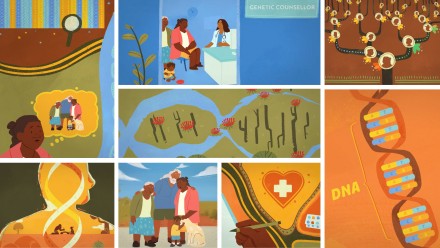Ethics
Ethical oversight of NCIG's work presents challenges that go well beyond the requirements of most research projects.
Download
The samples in the NCIG Collection were collected in line with the ethical norms of the time of collection. Those practices shifted over time. It became clear that the ethical protocols which had underpinned the collection were out of step with contemporary views and a new approach was required, although not yet clearly articulated. The collection was closed to scientific use from the late 1990s and remained so for approximately 15 years.
At the end of that time, a way forward emerged. In the intervening years an increasingly sophisticated conversation had emerged world-wide about the nature of consent for participant involvement in research, and specifically, genomic research. Today, it is recognised that genetic research in Indigenous populations requires a specific set of ethical approaches due to the historical and ongoing oppression of Indigenous people and to their distinctive cultural beliefs and practices. Indigenous peoples the world over were driving the development of new best practices. As a result, the opportunity opened to reconsider the future of the collection held at ANU.
The National Centre for Indigenous Genomics was established on the recommendation of Indigenous Australians and under the governance of Indigenous Australians. The Governance Board has maintained a clear-eyed focus on establishing a strong and sustainable ethical core at the heart of NCIG. At a minimum, NCIG’s goals, policies and practices align with the AIATSIS Guidelines for Ethical Research in Australian Indigenous Studies 2012 and the NHMRC Road Map 3: A strategic framework for improving Aboriginal and Torres Strait Islander health through research, 2018. Put simply, the ethics protocol for NCIG’s research is based on three pillars: respect for culture and a culture of respect; participants in control of their samples and data; and conducting research that matters to Indigenous Australians and that has the potential to make a difference.
Ethics Protocol
The NCIG Ethics Protocol applies to research conducted internally by NCIG as an essential part of developing the NCIG Collection (referred to as NCIG Research). It also covers how NCIG controls access and use of material in the Collection in specific research projects (referred to as External Research Projects). It does not, however, cover External Research Projects themselves. These require separate ethics protocols in order to access and use material in the Collection.
Ethical oversight of NCIG's work presents challenges that go well beyond the requirements of most research projects.
NCIG addresses these challenges by including the NCIG Board in ethical oversight to ensure appropriate Indigenous involvement, and by incorporating into the fabric of the organisation the capacity to innovate, to develop new standards of ethical practice, and to improve processes over time in light of operating experience and in response to community expectations.
First established in 2015, the NCIG ANU Human Research Ethics Committee (HREC) Protocol #2015/065 has since been reviewed to ensure it remained compliant and fit for purpose subsequent to the establishment of the NCIG Statute in late 2016. A major revision of the protocol has now been commissioned, to be completed in the second half of 2020. Variations to the protocol will be sought where necessary to ensure the ethical management of NCIG Research reflects the insights and outcomes of several remarkable years of fieldwork and community engagement. The revised approved version of the Ethics Protocol will be available from this page in due course. The version attached is applicable until then.





